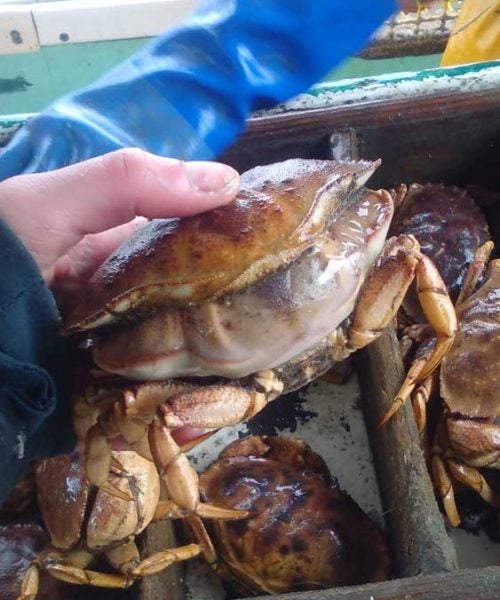Fishery and Biological Characteristics of Jonah crab in Rhode Island Sound (2015-2017)
Principal Investigator: Jeremy Collie (URI GSO)
Collaborators: Corinne Truesdale (URI GSO), Conor McManus (RI DEM)
Funding Source: U.S. Fish and Wildlife State Wildlife Grant
The Jonah crab (Cancer borealis) is an increasingly important marine resource in New England commercial trap fisheries, where landings of Jonah crab have risen nearly eight-fold since the 1990s. Rhode Island-based vessels have consistently accounted for about 25% of the United States commercial harvest, with Massachusetts comprising most of the remainder. Despite its rapid growth, the fishery was unregulated until 2015, when the first Fishery Management Plan (FMP) for Jonah crab was published by the Atlantic States Marine Fisheries Commission (ASMFC). The FMP highlights specific data needs necessary to inform sustainable management of the fishery. Data concerning the growth, distribution, and fishery characteristics of Jonah crab are considered priorities, and are important for understanding the impacts of increasing harvest levels on the resource biomass.
This project will (1) describe the size composition, sex ratios, and seasonal harvest trends of Jonah crabs in the commercial fishery through sea sampling on vessels operating in the Rhode Island Sound, and (2) characterize the growth and molting seasonality of adult Jonah crabs in Rhode Island waters by monitoring Jonah crabs in laboratories at DEM and the Graduate School of Oceanography. Results of this research will be provided to the ASMFC Jonah Crab Technical Committee for incorporation into the FMP and range-wide stock assessment.
 Home
Home Browse
Browse Close
Close Events
Events Maps
Maps Email
Email Brightspace
Brightspace eCampus
eCampus



